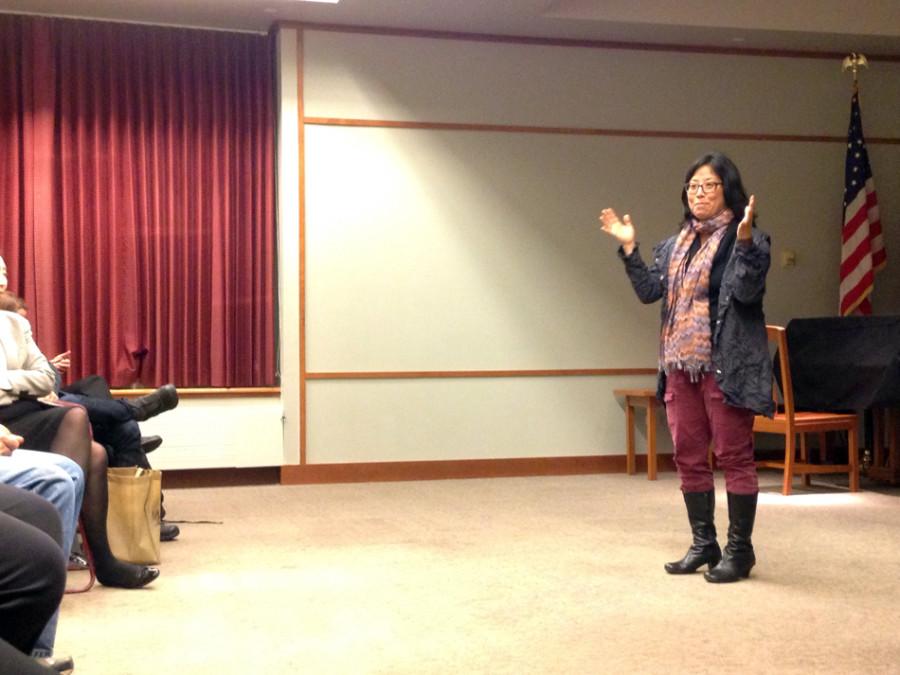Northwestern, Evanston Public Library host filmmaker, documentary screening
Billy Kobin/The Daily Northwestern
Grace Lee addresses an audience of about 25 following a screening of her documentary “American Revolutionary: The Evolution of Grace Lee Boggs” at Evanston Public Library on Thursday. The documentary focuses on the life and work of Chinese-American civil rights activist Grace Lee Boggs.
April 24, 2015
Evanston Public Library and Northwestern’s Asian American Studies Program screened a documentary about a Chinese-American activist Thursday, followed by a Q&A session with the filmmaker.
About 25 people attended the screening of “American Revolutionary: The Evolution of Grace Lee Boggs” at EPL, 1703 Orrington Ave. Filmmaker Grace Lee’s documentary, which won a Peabody Award, focuses on the life of Grace Lee Boggs, an activist, philosopher and writer who for 75 years fought in Detroit for the rights of American workers and youth, as well as participated in the labor, civil rights, Black Power and other movements.
“I had never met a Chinese-American activist in the black community in Detroit before, and I just wondered: How did she get there?” Lee told The Daily.
The film profiled Boggs and the impact of her extensive activism.
“We have a lot of stereotypes about Asian-Americans, and there are a lot of stereotypes about all kinds of different ethnic groups,” Lesley Williams, EPL’s head of adult services, said. “But the idea of the Asian-American woman in particular as being doubtful, as being submissive, as being passive … (Boggs) is just such a wonderful, refreshing, complete rejection of all of those stereotypes. I think it’s just an inspiring story, and I think there is a lot for people to learn from it even now.”
The 82-minute documentary showed how Boggs, described in the film as a Marxist surveilled by the FBI, first learned about the civil rights movements in 1940s Chicago, when African-Americans protested rat infestation in housing. She later moved to Detroit, the site of race riots in 1967, and began a life fighting for equality.
“We had to change ourselves in order to change the world,” Boggs says in the film.
History professor Ji-Yeon Yuh, director of the Asian American Studies Program, told The Daily that Boggs is an exemplary grassroots activist.
“Her life is just so incredibly rich and really fascinating. It upends a lot of stereotypes about Asian-Americans, about women and about activism,” Yuh told The Daily. “What happened in Detroit, a Midwestern, urban, industrial city, could happen in Chicago.”
NU’s Office of the Provost and EPL funded the event.
“(Yuh) just thought that this is such a fascinating story and such a well-received documentary that it would be great to show it in some place that was really more accessible to the general public and not just to the academic community,” Williams said. “She recognized that the library … shows a lot of documentaries, and I think we’re getting a reputation for being the place where people can catch up on documentaries and speakers that they might not otherwise have a chance to hear or see.”
Lee answered questions after the screening regarding the filmmaking process.
“It was a huge endeavor. I didn’t realize how much of an archival film it would be,” Lee said. “(Boggs) would never not answer questions — you would just have to ask the right questions.”
Lee told The Daily she hopes the audience felt a sense of who Boggs really is.
“Her story is really an American story,” Lee said. “Her ideas are ideas that I think are useful to anybody, whether you’re an activist or a student or just somebody trying to live their life.”
Email: [email protected]
Twitter: @Billy_Kobin


